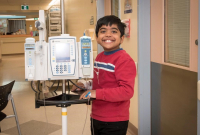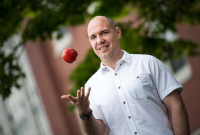Support strong Canadian climate journalism for 2025
The passionate advocacy work of Jerry Lewis has left an indelible mark in Canada, says the head of Muscular Dystrophy Canada.
CEO Barbara Stead-Coyle credits much of today's research breakthroughs to the tireless fundraising efforts of the comic and telethon giant, who died Sunday.
"It is part of our DNA, it is part of our history and I hope that someday we can make him proud by saying that the work is done, we found the cures," Stead-Coyle said Monday.
Lewis's star-packed telethons ran every Labour Day weekend from 1966 to 2010, a family viewing tradition for Stead-Coyle and many others who caught a homegrown feed that included local content and pleas for funds that would support Canadian families.
It wasn't clear how much money went to Canada, where firefighters have also driven significant donations since 1954 and now raise about $3 million a year.
But the end-of-summer ritual — which revolved around emotional pitches from Lewis — went far beyond just raising dollars for research and advocacy work, says Stead-Coyle.
She salutes him for raising awareness for a relatively rare condition, which in turn boosted her organization's efforts to lobby the government for access to education, jobs and clinical trials.
"It really played a pivotal role over and above just the dollars it generated. It gave our clients a platform to share their stories."
Stead-Coyle drew a direct line from Lewis's work to new treatment possibilities that offer "incredible hope."
"I'm very privileged to see how that money was put to work and how the research breakthroughs are now coming to the forefront like never before," says Stead-Coyle, whose sister and step-brother were diagnosed with neuromuscular disorders as adults.
Lewis, who had battled the lung disease pulmonary fibrosis, heart issues, a debilitating back problem, and addiction to pain killers, died of natural causes, according to his publicist.
He died at home in Las Vegas at age 91.





Comments